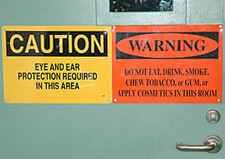Home | Glossary | Resources | Help | Contact Us | Course Map
Archival Notice
This is an archive page that is no longer being updated. It may contain outdated information and links may no longer function as originally intended.
Management and Supervisory Responsibilities
Management and supervisory areas of responsibilities in the laboratory include
- safety training,
- personnel protection,
- physical plant,
- emergency response preparation.
Safety Training
For the protection of laboratory personnel and the laboratory, new examiners as well as current employees are provided with safety information and training per laboratory protocol that may include the following:
- Published safety rules distributed to all personnel
- Posting of all safety rules in all firearms-related areas of the laboratory
- Firearms-related safety training
- General forensic training (e.g., biohazards, chemical)
- General first aid procedures
- Safe use of power tools and hand tools
- Use of laboratory equipment
Protection of Personnel
Personal Protective Equipment
Laboratory safety protocols should provide for the issue of personal protective equipment (PPE) for each employee, and may include
- eye protection,
- hearing protection,
- laboratory coats,
- protective gloves,
- particulate masks and filters,
- face shields,
- body armor.
Preventive Health Measures
In addition to the use of personal protective equipment, preventive health measures provide additional health protection and may include
- annual physical examinations,
- periodic blood testing for lead levels,
- hearing tests,
- hepatitis vaccine, as appropriate,
- annual tuberculosis screening.
Additional Online Courses
- What Every First Responding Officer Should Know About DNA Evidence
- Collecting DNA Evidence at Property Crime Scenes
- DNA – A Prosecutor’s Practice Notebook
- Crime Scene and DNA Basics
- Laboratory Safety Programs
- DNA Amplification
- Population Genetics and Statistics
- Non-STR DNA Markers: SNPs, Y-STRs, LCN and mtDNA
- Firearms Examiner Training
- Forensic DNA Education for Law Enforcement Decisionmakers
- What Every Investigator and Evidence Technician Should Know About DNA Evidence
- Principles of Forensic DNA for Officers of the Court
- Law 101: Legal Guide for the Forensic Expert
- Laboratory Orientation and Testing of Body Fluids and Tissues
- DNA Extraction and Quantitation
- STR Data Analysis and Interpretation
- Communication Skills, Report Writing, and Courtroom Testimony
- Español for Law Enforcement
- Amplified DNA Product Separation for Forensic Analysts



